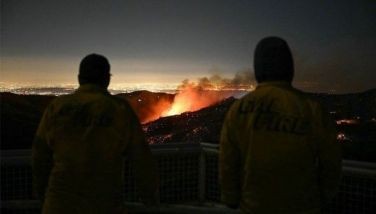CA allows oath-taking of nursing exam passers
October 14, 2006 | 12:00am
Most of the over 17,000 examinees who passed the leakage-tainted nursing licensure exams in June may now take their oaths as nurses because they did not appear to have benefited from the leakage, the Court of Appeals (CA) ruled yesterday.
The appellate court’s first division ordered the Professional Regulation Commission (PRC) to swear in the new nurses, almost two months after a restraining order from the tribunal stopped the oath-taking.
"In an attempt to flush out the poison brought about by the leakage, the respondents treated all the examinees as if they all profited from the leakage. This should never be countenanced," the CA said.
However, the CA ruled that 1,687 who passed the licensure examinations will have to retake the two portions of the five-part examination — tests III and V — where questions were leaked to examinees because the court believed they shouldn’t have passed.
Nearly 1,200 examinees who were initially among those who passed — but were later given failing scores by the PRC after it recomputed the licensure examination’s overall scores to negate the outcome of the leakage — may also join the over 17,000 who will be sworn in.
Malacañang praised the court decision. President Arroyo initially rejected calls for new exams, saying it would be unfair to those who did not cheat and passed.
She later made a turnaround and ordered a retake, only to change her mind and await a recommendation from Labor Secretary Arturo Brion, whom she had tasked to make a review after the National Bureau of Investigation (NBI) had concluded its investigation.
In a 33-page ruling penned by Associate Justice Vicente Veloso, the CA’s first division conceded that questions from tests 3 and 5 were leaked to at least three review centers — Gapuz Review Center Inc., Inress Review Center Inc. and Pentagon Specialists Inc.
"As a result, respondents (PRC and its Board of Nursing), upon advice of experts, invalidated 20 questions in test 3 and credited the remaining 80 questions thereof with 100 points. For test 5, the respondents toned down its weight from 20 percent to 10 percent. The purpose, according to them, is to remove whatever advantage some examinees may have gained from the leakage," the ruling stated.
However, because of the recomputed scores, 1,687 examinees who initially failed got a boost and passed while 1,200 others who passed got failing scores.
"They recomputed the grades and came up with an increased passing percentage... from 41.24 percent 42.42 percent (of the over 42,000 who took the exam in June)," the CA said.
However, the appellate court took note of a resolution issued by the nursing board shortly after the leakage was discovered.
In its Resolution No. 31, the nursing board stated there were indications that the leakage was not widespread and was not of much use to the examinees.
The board found that the leaked questions were simply too many and were given only two days before examination day to nursing graduates who were most likely already overloaded from the reviewing.
Further, the actual test questions did not follow the order of the leaked questions "because of internal PRC security control measures."
The CA also cited the nursing board’s other findings.
"Such prefatory (whereas) clauses therefore inform us of the lack of need to wholly invalidate 20 questions of test 3 and to tone down the weight of test 5 from 20 percent to 10 percent (in computing the overall score). There was no need for the respondents to ignore the true results of tests 3 and 5 because as admitted by PRC and Board of Nursing in their memorandum: there was no unusual upward pull in tests 3 and 5, no clustering of scores, no remarkable rise in the performance of the regional examination sites, no widespread leakage and no preponderant evidence on who knowingly benefited from the 90 leaked questions based on the test results," the court ruling stated.
With that, the court said the PRC committed a grave abuse of discretion in recomputing the overall scores.
"Grave abuse of discretion implies a capricious and whimsical exercise of judgment that (is) tantamount to lack of jurisdiction. In this case, respondents’ acts of invalidating 20 questions in test 3 and recomputing the scores in test 5 indubitably constitute, therefore, grave abuse of discretion. If despite the leakage, the test results could still form a reliable basis for determining competency, reason dictates that the results, as they were, should have been respected by respondents. We thus find respondents’ employed scheme... illogical, arbitrary and patently erroneous."
Because of Resolution No. 31, about 1.18 percent or 1,687 examinees benefited from the recomputation and passed and nearly 1,200 who were among those who passed got failing marks.
"Such increase of 1.18 percent which benefited 1,687 examinees who actually failed, as their names did not appear in the unaltered results, but who resultantly passed when the Ibe Formula (used in the recomputation) was introduced, constitutes a clear case of grave abuse of discretion," the court stated.
"It is whimsical and capricious as said 1,687 examinees were allowed to pass without their satisfying the standards set by the Nursing Act of 2002 on how examinees may be rated in a licensure examination," it said.
The PRC likewise "gravely abused its discretion" in flunking the 1,186 who had initially passed, the CA said.
"To emphasize, said list of 42.42 percent successful examinees no longer carried their names. Indeed, the act of failing 1,186 examinees who actually passed in the June 11 and 12, 2006 examination is a serious, if not gravest abuse of discretion one can imagine. Yet again, sans preponderant evidence on those examinees who particularly benefited from the leak, there clearly would be no basis for applying a unified formula of de-evaluating the scores of all examinees," the CA said.
The court added that the equal protection clause under the Constitution means that "no person or class of persons shall be deprived of the same protection of laws which is enjoyed by other persons or other classes in the same place and in like circumstances."
It emphasized that ordering a retake would not only be too costly for the government, but it would be costlier for the examinees who hardly have the financial means for another examination.
"Besides, the challenged nursing licensure examination is not supposed to address problems on credibility," it said.
The court order stemmed from a petition filed in August by faculty members of the University of Santo Tomas and two nursing associations, the League of Concerned Nurses and the Binuklod na Samahan ng mga Student Nurse.
They said the PRC and the nursing board should protect the integrity and competence of the profession "by ensuring that only those who have qualified in appropriate examinations are allowed into the profession."
Malacañang hailed the ruling. "It is a vindication of the Palace position," presidential chief of staff Michael Defensor said. "We have been saying from the start that we have to wait for the final and conclusive report of the NBI."
Defensor said a decision on the leakage "has to be based on facts and evidence. It will not only strengthen and validate Palace position but this will also be fair to all those concerned."
Last Wednesday, the NBI bared that the leakage was limited only in Baguio City and Manila. The probe also found 17 officials of three review centers suspected of involvement.
The Department of Labor and Employment, which has supervision over the PRC, will decide on the issue. — With Aurea Calica
The appellate court’s first division ordered the Professional Regulation Commission (PRC) to swear in the new nurses, almost two months after a restraining order from the tribunal stopped the oath-taking.
"In an attempt to flush out the poison brought about by the leakage, the respondents treated all the examinees as if they all profited from the leakage. This should never be countenanced," the CA said.
However, the CA ruled that 1,687 who passed the licensure examinations will have to retake the two portions of the five-part examination — tests III and V — where questions were leaked to examinees because the court believed they shouldn’t have passed.
Nearly 1,200 examinees who were initially among those who passed — but were later given failing scores by the PRC after it recomputed the licensure examination’s overall scores to negate the outcome of the leakage — may also join the over 17,000 who will be sworn in.
Malacañang praised the court decision. President Arroyo initially rejected calls for new exams, saying it would be unfair to those who did not cheat and passed.
She later made a turnaround and ordered a retake, only to change her mind and await a recommendation from Labor Secretary Arturo Brion, whom she had tasked to make a review after the National Bureau of Investigation (NBI) had concluded its investigation.
In a 33-page ruling penned by Associate Justice Vicente Veloso, the CA’s first division conceded that questions from tests 3 and 5 were leaked to at least three review centers — Gapuz Review Center Inc., Inress Review Center Inc. and Pentagon Specialists Inc.
"As a result, respondents (PRC and its Board of Nursing), upon advice of experts, invalidated 20 questions in test 3 and credited the remaining 80 questions thereof with 100 points. For test 5, the respondents toned down its weight from 20 percent to 10 percent. The purpose, according to them, is to remove whatever advantage some examinees may have gained from the leakage," the ruling stated.
However, because of the recomputed scores, 1,687 examinees who initially failed got a boost and passed while 1,200 others who passed got failing scores.
"They recomputed the grades and came up with an increased passing percentage... from 41.24 percent 42.42 percent (of the over 42,000 who took the exam in June)," the CA said.
However, the appellate court took note of a resolution issued by the nursing board shortly after the leakage was discovered.
In its Resolution No. 31, the nursing board stated there were indications that the leakage was not widespread and was not of much use to the examinees.
The board found that the leaked questions were simply too many and were given only two days before examination day to nursing graduates who were most likely already overloaded from the reviewing.
Further, the actual test questions did not follow the order of the leaked questions "because of internal PRC security control measures."
The CA also cited the nursing board’s other findings.
"Such prefatory (whereas) clauses therefore inform us of the lack of need to wholly invalidate 20 questions of test 3 and to tone down the weight of test 5 from 20 percent to 10 percent (in computing the overall score). There was no need for the respondents to ignore the true results of tests 3 and 5 because as admitted by PRC and Board of Nursing in their memorandum: there was no unusual upward pull in tests 3 and 5, no clustering of scores, no remarkable rise in the performance of the regional examination sites, no widespread leakage and no preponderant evidence on who knowingly benefited from the 90 leaked questions based on the test results," the court ruling stated.
With that, the court said the PRC committed a grave abuse of discretion in recomputing the overall scores.
"Grave abuse of discretion implies a capricious and whimsical exercise of judgment that (is) tantamount to lack of jurisdiction. In this case, respondents’ acts of invalidating 20 questions in test 3 and recomputing the scores in test 5 indubitably constitute, therefore, grave abuse of discretion. If despite the leakage, the test results could still form a reliable basis for determining competency, reason dictates that the results, as they were, should have been respected by respondents. We thus find respondents’ employed scheme... illogical, arbitrary and patently erroneous."
Because of Resolution No. 31, about 1.18 percent or 1,687 examinees benefited from the recomputation and passed and nearly 1,200 who were among those who passed got failing marks.
"Such increase of 1.18 percent which benefited 1,687 examinees who actually failed, as their names did not appear in the unaltered results, but who resultantly passed when the Ibe Formula (used in the recomputation) was introduced, constitutes a clear case of grave abuse of discretion," the court stated.
The PRC likewise "gravely abused its discretion" in flunking the 1,186 who had initially passed, the CA said.
"To emphasize, said list of 42.42 percent successful examinees no longer carried their names. Indeed, the act of failing 1,186 examinees who actually passed in the June 11 and 12, 2006 examination is a serious, if not gravest abuse of discretion one can imagine. Yet again, sans preponderant evidence on those examinees who particularly benefited from the leak, there clearly would be no basis for applying a unified formula of de-evaluating the scores of all examinees," the CA said.
The court added that the equal protection clause under the Constitution means that "no person or class of persons shall be deprived of the same protection of laws which is enjoyed by other persons or other classes in the same place and in like circumstances."
It emphasized that ordering a retake would not only be too costly for the government, but it would be costlier for the examinees who hardly have the financial means for another examination.
"Besides, the challenged nursing licensure examination is not supposed to address problems on credibility," it said.
The court order stemmed from a petition filed in August by faculty members of the University of Santo Tomas and two nursing associations, the League of Concerned Nurses and the Binuklod na Samahan ng mga Student Nurse.
They said the PRC and the nursing board should protect the integrity and competence of the profession "by ensuring that only those who have qualified in appropriate examinations are allowed into the profession."
Malacañang hailed the ruling. "It is a vindication of the Palace position," presidential chief of staff Michael Defensor said. "We have been saying from the start that we have to wait for the final and conclusive report of the NBI."
Defensor said a decision on the leakage "has to be based on facts and evidence. It will not only strengthen and validate Palace position but this will also be fair to all those concerned."
Last Wednesday, the NBI bared that the leakage was limited only in Baguio City and Manila. The probe also found 17 officials of three review centers suspected of involvement.
The Department of Labor and Employment, which has supervision over the PRC, will decide on the issue. — With Aurea Calica
BrandSpace Articles
<
>
- Latest
- Trending
Trending
Latest
Trending
Latest
Recommended





























